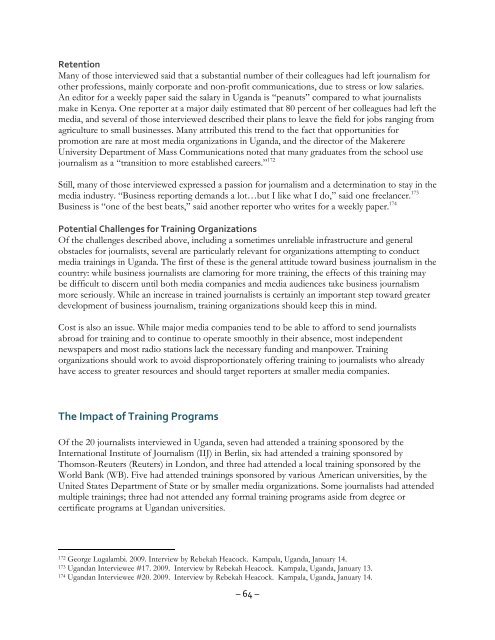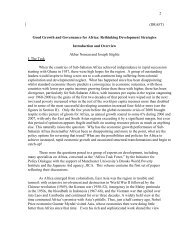RetentionMany of those interviewed said that a substantial number of their colleagues had left journalism <strong>for</strong>other professions, mainly corporate and non-profit communications, due to stress or low salaries.An editor <strong>for</strong> a weekly paper said the salary in Uganda is “peanuts” compared to what journalistsmake in Kenya. One reporter at a major daily estimated that 80 percent of her colleagues had left themedia, and several of those interviewed described their plans to leave the field <strong>for</strong> jobs ranging fromagriculture to small businesses. Many attributed this trend to the fact that opportunities <strong>for</strong>promotion are rare at most media organizations in Uganda, and the director of the MakerereUniversity Department of Mass Communications noted that many graduates from the school usejournalism as a “transition to more established careers.” 172Still, many of those interviewed expressed a passion <strong>for</strong> journalism and a determination to stay in themedia industry. “Business reporting demands a lot…but I like what I do,” said one freelancer. 173Business is “one of the best beats,” said another reporter who writes <strong>for</strong> a weekly paper. 174Potential Challenges <strong>for</strong> Training OrganizationsOf the challenges described above, including a sometimes unreliable infrastructure and generalobstacles <strong>for</strong> journalists, several are particularly relevant <strong>for</strong> organizations attempting to conductmedia trainings in Uganda. The first of these is the general attitude toward business journalism in thecountry: while business journalists are clamoring <strong>for</strong> more training, the effects of this training maybe difficult to discern until both media companies and media audiences take business journalismmore seriously. While an increase in trained journalists is certainly an important step toward greaterdevelopment of business journalism, training organizations should keep this in mind.Cost is also an issue. While major media companies tend to be able to af<strong>for</strong>d to send journalistsabroad <strong>for</strong> training and to continue to operate smoothly in their absence, most independentnewspapers and most radio stations lack the necessary funding and manpower. Trainingorganizations should work to avoid disproportionately offering training to journalists who alreadyhave access to greater resources and should target reporters at smaller media companies.The Impact of Training ProgramsOf the 20 journalists interviewed in Uganda, seven had attended a training sponsored by theInternational Institute of Journalism (IIJ) in Berlin, six had attended a training sponsored byThomson-Reuters (Reuters) in London, and three had attended a local training sponsored by theWorld Bank (WB). Five had attended trainings sponsored by various American universities, by theUnited States Department of State or by smaller media organizations. Some journalists had attendedmultiple trainings; three had not attended any <strong>for</strong>mal training programs aside from degree orcertificate programs at Ugandan universities.172 George Lugalambi. 2009. Interview by Rebekah Heacock. Kampala, Uganda, January 14.173 Ugandan Interviewee #17. 2009. Interview by Rebekah Heacock. Kampala, Uganda, January 13.174 Ugandan Interviewee #20. 2009. Interview by Rebekah Heacock. Kampala, Uganda, January 14.– 64 –
The majority of those interviewed believed that training is the best way to improve business andeconomic journalism in Uganda. “The biggest problem we have is training,” said one broadcastjournalist 175 ; “training, training, training,” emphasized a <strong>for</strong>mer reporter. 176Training programs available to business and economic journalists in UgandaNearly everyone interviewed said a lack of training was one of the biggest challenges <strong>for</strong> businessand economics reporters. Local training opportunities are rare, and many editors complained thateven university-educated journalists enter the job market lacking basic reporting and writing skills.The Uganda Management Institute, widely cited as the top journalism school in the country, recentlyclosed its journalism program due to lack of funding, and Makerere University offers no businessjournalism courses. Existing training opportunities <strong>for</strong> business journalists are so infrequent that anassociate editor <strong>for</strong> a weekly magazine said that as far as business and economic journalism goes,“you make it up as you go.” 177UniversitiesMakerere University in Kampala was widely cited as offering the best undergraduate degree programin journalism, though no specialized business courses are currently available. In 2008, theDepartment of Mass Communications hired a curriculum consultant, and the school is dividing thecurrent Bachelor of Mass Communications program into two degrees, one in communications andone in journalism. The department would like to encourage specialization in topical areas, includingenvironment, health, business and politics, but the director noted that school’s ability to offer thesetracks depends on the funding they receive from the university and on the expertise of the peoplethey are able to hire with that funding.Several of those interviewed said that the Uganda Management Institute used to have the bestjournalism degree program in the country, but that it closed recently due to a lack of funding.Additional universities offering degree programs in journalism include Kampala InternationalUniversity, Mbale University, Uganda Christian (Mukono) University and the Islamic University inUganda.Many editors and experienced journalists criticized recent graduates from Makerere and otheruniversities, however. New graduates “leave a lot to be desired,” said one broadcast reporter, and itcan take two to three years on the job <strong>for</strong> someone with a degree in journalism to developappropriate reporting and writing skills. 178 The business editor <strong>for</strong> a major daily said the best way toimprove the quality of business journalism in Uganda would be to improve university programs.Additional Training OpportunitiesFew organizations in Uganda offer specialized business journalism training opportunities. Severalreporters have attended workshops at the Capital Markets Authority and the Uganda SecurityExchange, and one editor said the Uganda Media Development Foundation offers free, one-daytrainings.175 Ugandan Interviewee #6. 2009. Interview by Rebekah Heacock. Kampala, Uganda, January 6.176 Ugandan Interviewee #2. 2009. Interview by Rebekah Heacock. Kampala, Uganda, January 5.177 Ugandan Interviewee #7. 2009. Interview by Rebekah Heacock. Kampala, Uganda, January 8.178 Ugandan Interviewee #6. 2009. Interview by Rebekah Heacock. Kampala, Uganda, January 6.– 65 –
- Page 1 and 2:
THEREWILLBE INKA study of journalis
- Page 3 and 4:
AcknowledgementsThis paper has bene
- Page 7 and 8:
Executive SummaryPurpose of the Rep
- Page 9 and 10:
journalists in these countries that
- Page 11 and 12:
Existing International Training Opp
- Page 13 and 14:
• Consumer Affairs and Informatio
- Page 15 and 16:
Background 3Of the three countries
- Page 17 and 18:
pervasive conflict in the Niger Del
- Page 19 and 20: 3) Crises or disruptions, where som
- Page 21 and 22: Low pay and low regardOne of the mo
- Page 23 and 24: Even in cases where working journal
- Page 25 and 26: But while some reporters think FOIB
- Page 27 and 28: When asked how much the media could
- Page 29 and 30: the effects of these challenges for
- Page 31 and 32: detailed analysis of the opportunit
- Page 33 and 34: journalist said he has, however,
- Page 35 and 36: completely make use of some of the
- Page 37 and 38: money. Their knowledge of what medi
- Page 39 and 40: Notes on conducting research in Nig
- Page 41 and 42: Ghana- 35 -
- Page 43 and 44: evenues each year,” 106 which wou
- Page 45 and 46: entertainment news, scandals, and p
- Page 47 and 48: The rise of business-focused journa
- Page 49 and 50: coverage of the oil industry is als
- Page 51 and 52: needed supplementary income to cash
- Page 53 and 54: as supporting one political party o
- Page 55 and 56: Numerous journalists recounted how
- Page 57 and 58: Training programs available to busi
- Page 59 and 60: Amos Safo, editor-in-chief at the p
- Page 61 and 62: Notes on conducting research in Gha
- Page 63 and 64: Background 136Literacy and Educatio
- Page 65 and 66: “sufficient information” about
- Page 67 and 68: or criminal charges for content the
- Page 69: have such difficulty obtaining info
- Page 73 and 74: commitment to their profession and
- Page 75 and 76: Notes on Conducting Research in Uga
- Page 77 and 78: Recommendations for Revenue Watch I
- Page 79 and 80: people who have no journalism backg
- Page 81 and 82: analyzes business,” he said, “e
- Page 83 and 84: A journalist with The Punch said,
- Page 85 and 86: The Media Foundation for West Afric
- Page 87 and 88: Length of TrainingRoughly three-qua
- Page 89 and 90: industries, for instance, ought to
- Page 91 and 92: otherwise being published in the pr
- Page 93 and 94: Non-Training Recommendations for Ug
- Page 95 and 96: Appendix A: NigeriaPotential Partne
- Page 97 and 98: journalists. Biakolo is very profes
- Page 99 and 100: Television Stations• Nigerian Tel
- Page 101 and 102: have two to four month professional
- Page 103 and 104: City: AccraTelephone: +233 (021) 22
- Page 105 and 106: Fax: +256 414 255 495E-mail: umdf@a
- Page 107 and 108: • What do you think are the most
- Page 109 and 110: Appendix E: Survey Questions1. Name
- Page 111 and 112: 18. How effective were the teaching
- Page 113 and 114: 28. What are the most important cha
- Page 115 and 116: 1. Journalists by Country2. How wou
- Page 117 and 118: 5. How often do you travel out of t
- Page 119 and 120: 9. Which organization(s) sponsored
- Page 121:
12. After completing the training(s














